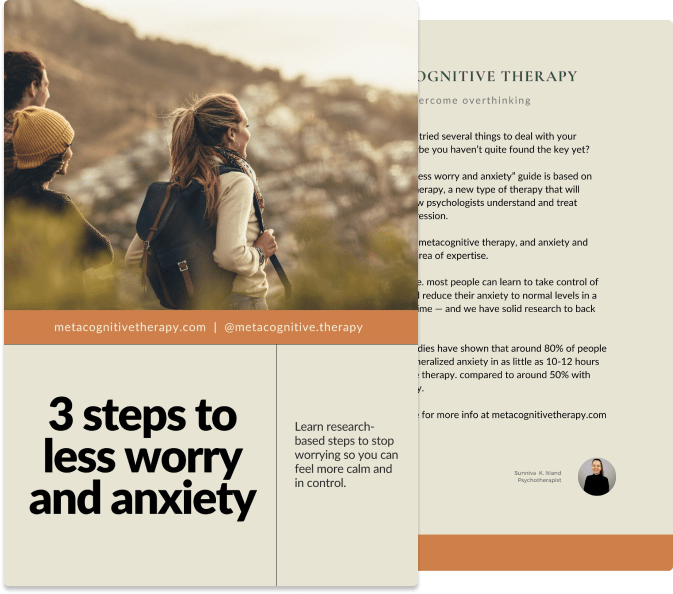Break the people-pleasing cycle and learn to set boundaries with Metacognitive Therapy

Download our best tips on reducing anxiety and worrying
Learn three powerful metacognitive therapy steps to stop the worry cycle, reduce anxiety, and feel calmer in everyday life.
.jpeg)
.jpeg)
Many people describe themselves as “natural people-pleasers,” and believe it’s just part of who they are. If you’re reading this, you might consider yourself one of them.
But from the Metacognitive Therapy (MCT) perspective, people-pleasing isn’t a personality trait, it’s a coping strategy—a learned mental habit used to avoid uncomfortable emotions.
The discomfort we try to avoid usually comes from the fear of disappointing others, being judged, guilt, or falling short of expectations. Saying “no,” setting a boundary, or even hesitating to agree with a request can spark unbearable internal tension for people-pleasers. Fear of disapproval is common for most of us, but for some, that discomfort feels like a danger, rather than a normal part of being human.
It turns out changing your thinking style—not your personality—can help you set boundaries. That’s where MCT comes in.
People-pleasing is driven by rumination and worry
Feeling uncomfortable when saying no is natural. But the discomfort lingers for those stuck in people-pleasing cycles, because of how they continue to think about it. What might have been a brief moment of awkwardness becomes a prolonged, painful cycle of overthinking.
People who struggle with boundaries tend to ruminate quite a bit, mentally rehearsing what they’ll say and self-monitoring before and after social interactions. Before saying no, they might think:
- What will they think of me?
- What if they’re disappointed?
After they say “no”, they replay the situation, worrying about:
- Should I have done that?
- Were they upset?
- Did I mess it up?
This persistent mental chatter doesn’t help people make better decisions or feel more confident. The repetitive thinking keeps the emotional discomfort alive, intensifies it, and makes future boundaries feel even harder to set. In MCT this is known as a problematic thinking style, not because the emotions are wrong, but because the response of rumination and worry prolong them unnecessarily. This leads people to believe they need to say yes or over-deliver just to relieve the discomfort.

Download our best tips on reducing anxiety and worrying
Learn three powerful metacognitive therapy steps to stop the worry cycle, reduce anxiety, and feel calmer in everyday life.
Why boundaries feel so hard
When someone repeatedly responds to difficult emotions by avoiding them (saying yes when they want to say no) they reinforce the belief that the only way to make discomfort go away is to say 'yes' and people please, and to have no boundaries. They end up losing the opportunity to practice saying no and letting the discomfort pass and self-regulate. This creates a cycle: say yes, feel temporary relief, ruminate, fear saying no in the future even more.
People-pleasing is actually about managing internal distress, and MCT helps people see that the problem isn’t setting boundaries or saying no, it’s how much attention they give to the discomfort and worry around their boundaries.
Learning to let thoughts and feelings be
A core principle of Metacognitive Therapy is that thoughts and feelings aren’t actually harmful — they’re just passing mental noise that we can notice without engaging. Instead of trying to problem solve or ruminate on every worry or self-critical thought, you can learn to let them pass using detached mindfulness.
For example: Someone might notice the thought, “They’ll be upset if I say no,” and simply acknowledge it without trying to solve it or avoid it. Practicing detached mindfulness allows the thought to fade naturally, without needing to please others in order to quiet it.
People who reduce rumination and worry discover that the feelings they once feared—guilt, awkwardness, self-doubt—are completely tolerable. They come and go like any other emotion.
Setting sustainable boundaries
When you stop using worry and rumination as coping tools, you’ll find it’s easier to tolerate temporary discomfort and to make choices that best serve you. Setting healthy boundaries doesn’t require a personality overhaul or learning to be more assertive. It just requires noticing the thinking habits that make boundaries feel so scary in the first place. Like any habit, people-pleasing can be changed.
If you find yourself struggling with ongoing general anxiety, check out this article to break free from the cycle of Generalized Anxiety Disorder.



